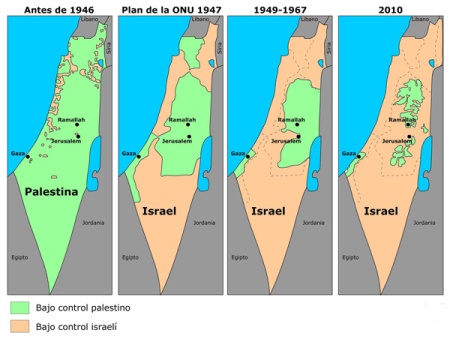Serrat i Sabina. Sabina i Serrat. Canten a la pau, la llibertat i els drets humans però sembla que no creuen massa en les seves pròpies cançons. Decepcionant. Insultant.
Serrat. Després de parlar amb els companys de la campanya BDS (Boicot, Desinversions i Sancions a l’Estat d’Israel mentre no compleixi amb la legalitat internacional) accedeix a visitar els territoris palestins ocupats però un cop a terreny se’n desdiu. Dubta i acaba apostant per no apropar-se massa a nous horitzons per no trencar els propis esquemes. És més còmode no veure el que fa mal, el que fa remoure entranyes i pensaments profunds arrelats a base de creure’s paraules sense comprovar per un mateix què hi ha darrere d’elles.
Sabina. Posa excuses per no reunir-se amb els companys de la campanya BDS. Diu que està en contra de tots els fonamentalismes (com si la defensa dels drets humans ho fós). Ignorant perillós que no és conscient de la seva ignorància. Davant del seu públic (al seu entendre no fonamentalista) deixa anar paraules que són molt més que simples paraules. Són la complicitat amb la violació dels drets humans i del dret internacional. Quasi res.
Sort que de tant en tant hi ha periodistes que no tenen pèls a la llengua i diuen les coses tal com són. Gràcies Joan Cañete per escriure més clar que l’aigua.

Sabina y Serrat, durante la rueda de prensa de presentación del concierto en Jerusalén.
Corre dijo la tortuga, atrévete dijo el cobarde, estoy de vuelta, dijo un tipo que nunca fue a ninguna parte. Shalom, dijo Joaquín Sabina, Salam alaikum, dijo Joan Manuel Serrat, y ambos iniciaron así, con este manido saludo del que se moja hasta el gaznate por no querer mojarse, un concierto en Tel-Aviv que ha sido ampliamente criticado por parte de la sociedad civil catalana y española.
Libertad de expresión: todo el mundo es libre de cantar donde le plazca, faltaría más. Responsabilidad: todo el mundo es responsable de los actos que comete, faltaría más. Yo no quiero calor de invernadero, yo no quiero besar tu cicatriz, yo no quiero París con aguacero ni Samaria sin ti, jugueteó ayer Sabina con la letra de una de sus hermosas canciones. No quiero Samaria sin ti, en Tel-Aviv, significa no quiero Cisjordania sin israelíes, ya que Samaria y Judea es la forma con la que Israel se refiere al territorio ocupado en 1967 de Cisjordania. Esto ya no es ir a Israel a cantar por la paz, o a aprender lo que de verdad sucede allí, sin intermediarios, o a satisfacer a la amplia colonia de suramericanos, como han argumentado los dos pájaros ante las peticiones de que se unieran al boicot al Estado hebreo.
¿Que lo de Samaria sin ti fue un guiño a la audiencia que suelen hacer los cantantes allí donde van, como ponerse la camiseta del Barça en el Sant Jordi o decir Bona nit Barcelona? Puede ser. Pero si uno tiene derecho a cantar donde le plazca los demás tienen derecho a explicar lo que de verdad significan sus palabras. Y si en algún lugar las palabras van cargadas con plomo ese es Oriente Próximo. Samaria sin ti. Seré breve, en la web es muy fácil encontrar estadísticas de todo tipo: en la Cisjordania ocupada por Israel han muerto a manos de militares o colonos casi 2.000 palestinos (unos 360, de ellos, menores) desde el 2000 y su economía depende por entero de la ayuda exterior a causa de “la falta de acceso a la tierra y los recursos en las áreas controladas por Israel y las restricciones de importación y exportación” (la cita, por cierto, es de The World Factbook de la CIA, ese ente tan antiisraelí). Samaria sin ti significa apoyar la ocupación israelí de los territorios palestinos y sus consecuencias en vidas, en pobreza, en vulneración de derechos humanos, etcétera. Samaria sin ti significa apoyar la conculcación de la legalidad internacional basada en las resoluciones de la ONU y las fronteras del 67 y rechazar la solución de los dos Estados, inviable con una Samaria sin ti. Samaria sin ti es tomar parte por el Estado que oprime a millones de personas, como en realidad también lo es, digamos las cosas como son, dar un concierto en Tel-Aviv (Peter Gabriel no cantó Biko en Pretoria). Simplemente para que queden las cosas claras, entre tanto Shalom y tanto Salam alaikum.
Este Samaria sin ti tiene algunas consecuencias. La primera, retratar en su justa medida a los dos grandes artistas y ¿ex? iconos progresistas que ayer, dicen, cantaron por la paz en Tel-Aviv ante una audiencia compuesta exclusivamente por israelíes. La segunda, reforzar en Catalunya y España el movimiento Boicot, Desinversión y Sanciones (BDS) contra el Estado de Israel, responsable de la campaña internacional que busca que a Israel se le trate como a Suráfrica en su momento. Es cierto que el movimiento de boicot no logró evitar el concierto, pero también lo es que ha puesto sobre la mesa en España el tema del boicot en todos los ámbitos (cultural, deportivo, económico, social) al Estado hebreo que en otros países (sobre todo en Gran Bretaña y los nórdicos) ha logrado logros de impacto. El vídeo viral de los cooperantes en Palestina ha sido decisivo, así como el trabajo en las redes sociales de tantos y tantos activistas anónimos. Boicotéame, decía el intelectual israelí Ilan Pappe, y esta arma de lucha contra la ocupación israelí de los territorios ocupados palestinos sale reforzada en España de su encontronazo con los pájaros.
Sálvame, dijo el verdugo; sé que has sido tú, dijo el culpable.
No me grites, dijo el sordo.
@jcbayle
Redes Sociales







